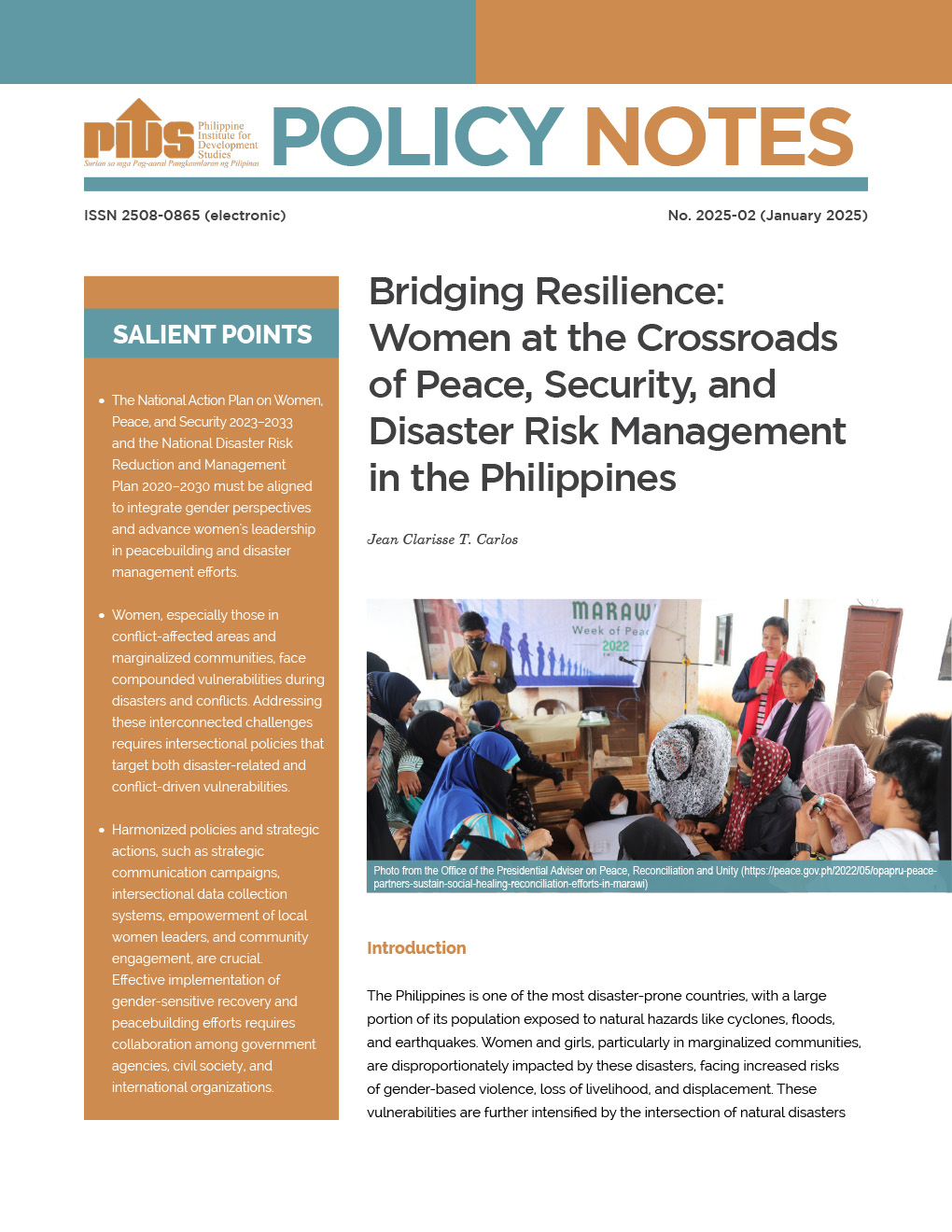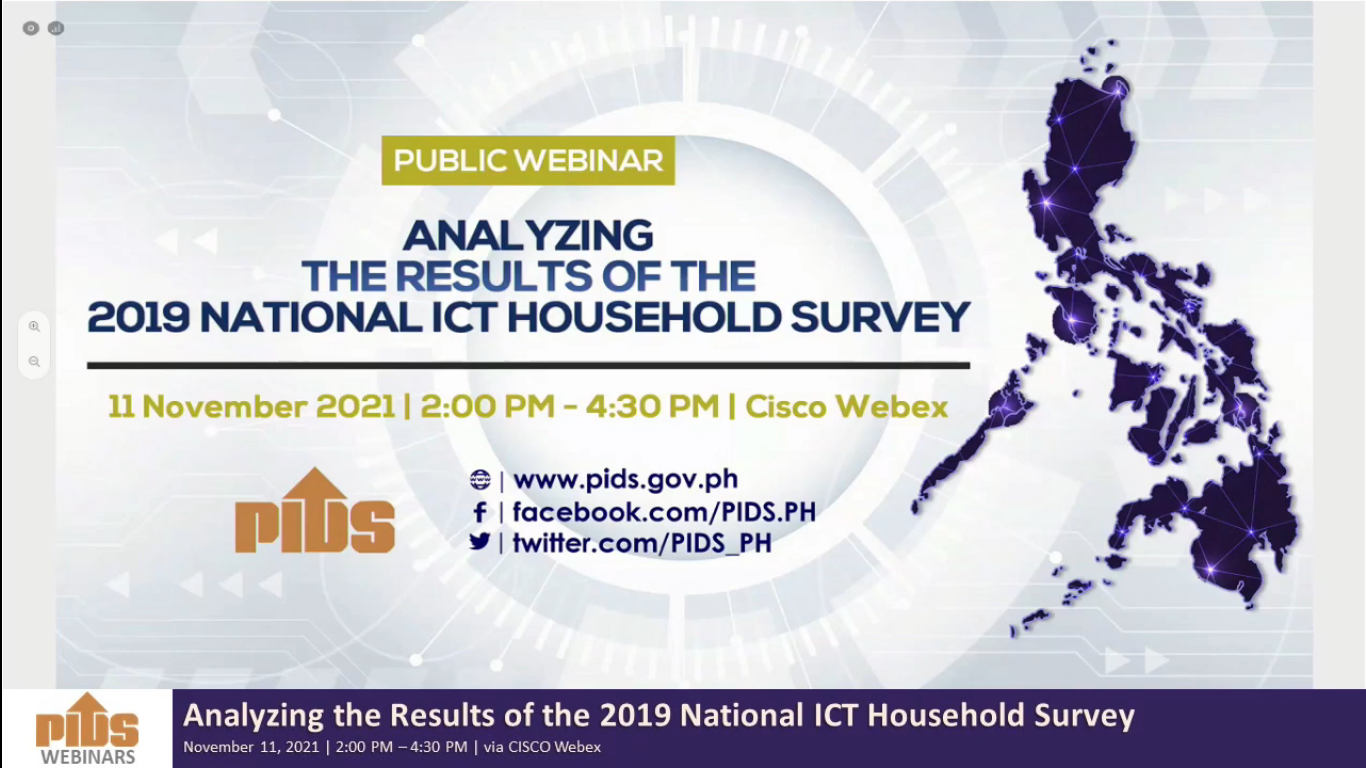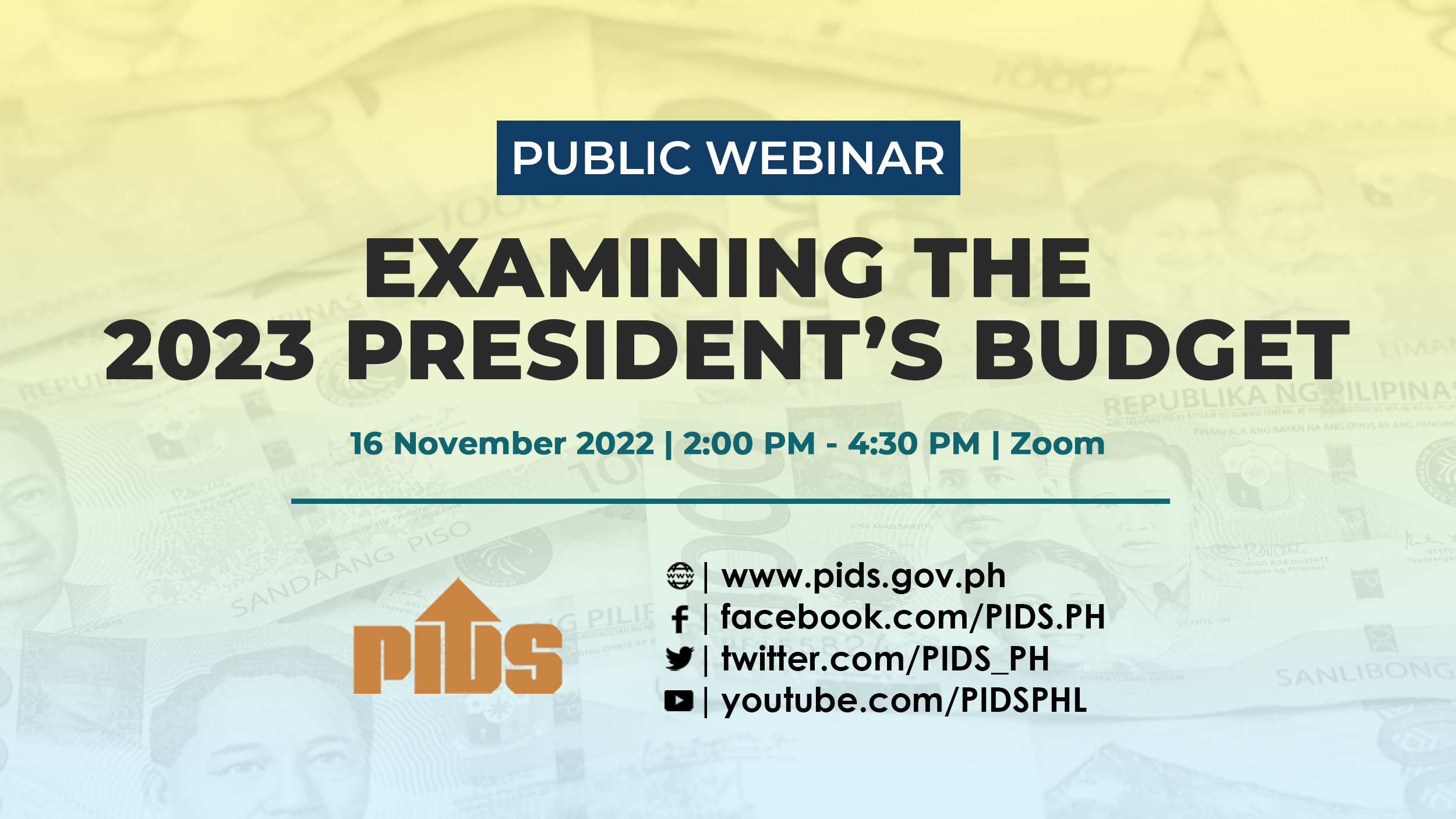THE Philippine Institute for Development Studies (PIDS) expressed concern that non-statistics related functions such as the implementation of the National ID or PhilSys could distract the Philippine Statistics Authority (PSA) from generating quality and timely data.
In a recent webinar, PIDS Research Fellow Jose Ramon G. Albert said based on a study he conducted with PIDS Research Specialist Jana Flor V. Vizmanos, there’s need to review the decision to give the PSA the PhilSys and the implementation of the Community Based Monitoring System (CBMS) law.
As it is, Albert said, delivering timely statistics remains a problem for PSA. This accounts for why the Philippines ranking in the World Bank’s Statistical Capacity Index, where it slumped to 4th place as of 2015 from being 1st between 2008 and 2012.
“This has been the concern of experts, that the PSA may be losing focus on its central mandate on statistics; there is even a law for PSA to handle the Community-based Monitoring System,” Albert said.
“Experts suggest studying whether or not PhilSys [and even CRS—the Civil Registry System] should continue in PSA given risks that PhilSys could be hacked: if and when this happens, public trust in PSA and in statistics can erode,” he added.
Albert said timeliness of survey data such as the Annual Survey of Philippine Business and Industry (ASPBI) is bugged by a two-year lag time. Other problems include those on agriculture data, as well as the Multidimension Poverty Index.
He added other timeliness issues include the base years used for the National Income Accounts and inflation. However, the PSA has already updated the NIA to 2018 prices while inflation now uses a 2012 base year.
Well-equipped
National Statistician Claire Dennis S. Mapa told the BusinessMirror on Sunday that the PSA is well-equipped to handle its mandate and the implementation of the PhilSys and CBMS are not distractions.
“The PSA is composed of four offices: sectoral statistics, census, Philippine registry office and the civil registration. These are headed by very capable deputies and able teams,” Mapa said.
“The National ID is under the PRO [Philsys Registry Office] and I do not see it as a distraction from the work of the PSA in producing official statistics. We were able to report timely official statistics during the community quarantine period,” he added.
Meanwhile, based on the results and recommendations of the study, Albert said one way to boost PSA’s efforts in producing timely and reliable statistics is giving the National Statistician a Cabinet rank.
This means the PSA can be detached from the National Economic and Development Authority (Neda) like the Commission on Higher Education (CHED) or Technical Education and Skills Development Authority (Tesda).
PSA, in a new setup, will focus on generating data; and functions such as the implementation of the National ID can be given to more appropriate agencies.
Albert told this newspaper that experts have recommended that the National ID be handled by the Department of Information Technology or “an agency that has a functional need for the ID such as Philhealth.”
“[The] issue is that what is best will depend on what we need and what are current country practices. As the paper suggests, the UNSD [United Nations Statistics Division] surveyed countries some are still under ministry of planning, or commerce, DTI equivalent or finance. Thai NSO is with MICT. Others are directly under office of prime minister or office of President or under legislative [branch],” Albert said.
Issues hounding PSA include funding and manpower lack. Albert said while PSA’s annual budget increased by 342.69 percent from 2014 nominally, PSA’s budget remained at 0.0148 percent of GDP between 2008 and 2017.
In terms of manpower, the government saw a decline in the number of statisticians between 2012 and 2014 due to the reorganization of the Philippine Statistical System (PSS). Manpower remains thin. Albert said that as of 2018, PSA has filled up only 85 percent of its 2,799 plantilla positions.
In 2015, it only had 1,943 positions filled, or only 69.4 percent of positions. This is compounded by the lack of PhD holders at the PSA.
“Government needs to invest in statistics, statisticians, and statistical organizations to ensure that the official statistics in the Philippine continue to be viewed well and will fare even much better than its current standing,” Albert said.
The PSA is the surviving entity from the merger of the National Statistics Office, National Statistical Coordination Board, Bureau of Labor and Employment Statistics, and the Bureau of Agriculture Statistics.
The PSA Act which was passed and signed into law in 2013 to repeal Executive Order 121 entitled “Reorganizing and Strengthening the PSS and for Other Purposes.”
In a recent webinar, PIDS Research Fellow Jose Ramon G. Albert said based on a study he conducted with PIDS Research Specialist Jana Flor V. Vizmanos, there’s need to review the decision to give the PSA the PhilSys and the implementation of the Community Based Monitoring System (CBMS) law.
As it is, Albert said, delivering timely statistics remains a problem for PSA. This accounts for why the Philippines ranking in the World Bank’s Statistical Capacity Index, where it slumped to 4th place as of 2015 from being 1st between 2008 and 2012.
“This has been the concern of experts, that the PSA may be losing focus on its central mandate on statistics; there is even a law for PSA to handle the Community-based Monitoring System,” Albert said.
“Experts suggest studying whether or not PhilSys [and even CRS—the Civil Registry System] should continue in PSA given risks that PhilSys could be hacked: if and when this happens, public trust in PSA and in statistics can erode,” he added.
Albert said timeliness of survey data such as the Annual Survey of Philippine Business and Industry (ASPBI) is bugged by a two-year lag time. Other problems include those on agriculture data, as well as the Multidimension Poverty Index.
He added other timeliness issues include the base years used for the National Income Accounts and inflation. However, the PSA has already updated the NIA to 2018 prices while inflation now uses a 2012 base year.
Well-equipped
National Statistician Claire Dennis S. Mapa told the BusinessMirror on Sunday that the PSA is well-equipped to handle its mandate and the implementation of the PhilSys and CBMS are not distractions.
“The PSA is composed of four offices: sectoral statistics, census, Philippine registry office and the civil registration. These are headed by very capable deputies and able teams,” Mapa said.
“The National ID is under the PRO [Philsys Registry Office] and I do not see it as a distraction from the work of the PSA in producing official statistics. We were able to report timely official statistics during the community quarantine period,” he added.
Meanwhile, based on the results and recommendations of the study, Albert said one way to boost PSA’s efforts in producing timely and reliable statistics is giving the National Statistician a Cabinet rank.
This means the PSA can be detached from the National Economic and Development Authority (Neda) like the Commission on Higher Education (CHED) or Technical Education and Skills Development Authority (Tesda).
PSA, in a new setup, will focus on generating data; and functions such as the implementation of the National ID can be given to more appropriate agencies.
Albert told this newspaper that experts have recommended that the National ID be handled by the Department of Information Technology or “an agency that has a functional need for the ID such as Philhealth.”
“[The] issue is that what is best will depend on what we need and what are current country practices. As the paper suggests, the UNSD [United Nations Statistics Division] surveyed countries some are still under ministry of planning, or commerce, DTI equivalent or finance. Thai NSO is with MICT. Others are directly under office of prime minister or office of President or under legislative [branch],” Albert said.
Issues hounding PSA include funding and manpower lack. Albert said while PSA’s annual budget increased by 342.69 percent from 2014 nominally, PSA’s budget remained at 0.0148 percent of GDP between 2008 and 2017.
In terms of manpower, the government saw a decline in the number of statisticians between 2012 and 2014 due to the reorganization of the Philippine Statistical System (PSS). Manpower remains thin. Albert said that as of 2018, PSA has filled up only 85 percent of its 2,799 plantilla positions.
In 2015, it only had 1,943 positions filled, or only 69.4 percent of positions. This is compounded by the lack of PhD holders at the PSA.
“Government needs to invest in statistics, statisticians, and statistical organizations to ensure that the official statistics in the Philippine continue to be viewed well and will fare even much better than its current standing,” Albert said.
The PSA is the surviving entity from the merger of the National Statistics Office, National Statistical Coordination Board, Bureau of Labor and Employment Statistics, and the Bureau of Agriculture Statistics.
The PSA Act which was passed and signed into law in 2013 to repeal Executive Order 121 entitled “Reorganizing and Strengthening the PSS and for Other Purposes.”












